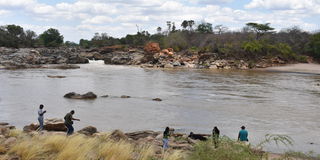Once vibrant, Kora National Park now isolated

The Adamson's Falls now inhabited with heavy rocks and invasive plant species that have taken over the white sandy beaches.
Kora National Park, the last wilderness abandoned deep in the North of Tana River county used to be Kenya's biggest income earner.
Legend has it that the land of the famous George Adamson alias Lion Man, reportedly earned the tourism industry more revenue than Tsavo in its 1970's and 80's hey days.
Ten, tourists flocked the game reserve owing to the serene environment and beautiful sceneries for bonfire activities, camping, boat fishing, rafting, and sand beaches walk. However, what attracted them more was the profound chemistry between Adamson and his lions.
Though known for its beauty defined by rocky inselbergs such as the 442-meter Kora Rock, domed hills that rise steeply from the surrounding area, and a wide variety of animal species including the big five except for the rhino, the national reserve is now a pale shadow of itself.
Its glory being pulled to the grave, alongside the spirit of George Adamson and his three lions.
"We have not had any serious tourists since the demise of Adamson. In a single year we receive less than 20 tourists," says Langat Ndere, the parks chief warden.
Covering an area of 1.78 square kilometers, Kora National Park, the third largest after the Tsavo's was gazetted as a national park in 1989.
Once Kenya's biggest income earner reserve, Kora is staring its moments of dusk with once beautiful sceneries now on the verge of disappearing.
The airstrip that offered safe landing for fixed-wing planes laden with tourists, has since grown bushy and unsafe for landing.
The road network to the park has turned rocky after being covered by mud, and sludge occasioned by heavy rains.
Invasive species brought by the floods during the rainy season have replaced the sandy beaches, leaving an eyesore of the once heavenly tourist destination.
"Adamson was killed by the shifta right about 70km from here, therefore the tourists who knew him still do relate to the incident," said Mr Lang'at.

Kora National Reserve Chief Warden Langat Ndere during an interview at the Kora National Park,Tana River County
In as much as the agencies has tried its level best to enhance security in the area, the park still suffers from high levels of human-wildlife conflict.
Herdsmen from the pastoralist community have invaded the wildlife migratory corridors, resulting in the drop of wildlife visiting the park.
As a result, what is left to see in place of the big four that once inhabited the park are camels and hungry antelopes in the almost arid park.
"This is the main issue that resulted in the killing of Adamson. these people have insisted on occupying the corridors and constructing villages there and are ready to shed blood to stay here," said the warden.
At the time, the community bred bandits well known as the 'Shifta' were a nuisance to the wild game and travelers into the area. Their endless desire to have the reserve for grazing, settlement, and a watering corridor, is yet to be quenched.
"It was not an small issue, but again it was not so intense that anyone imagined it could lead to the death of Adamson, but after the years it is slowly killing the park as well,” Mr Lang'at says.
Access to the park has been narrowed to one road through Mwingi, and by air through a helicopter. The area is cut from network connectivity, with officers living in the camps forced to climb tall rocks to get a grasp of the network at designated areas to send a message or make a call home.

Tana River County tourism officers alongside KWS warden at the gravesite of Adamson and his lions.
The camps that were once filled with guests have been left desolate, with the Adamson's camp sitting a graveyard under the guard of a local with the help of a warden.
"It's been long since the widow came to the camp, the last time she was here she hinted towards plans to close the camp and leave the country for good," he says.
The Park is locked down and has been on a downward spiral for the past 20 years, with efforts to revive it yet to yield fruits.
Tourism Cabinet Secretary Najib Balala's last visit to the park saw the access road to the Park through Mwingi undergoing some renovation, an exercise that is still ongoing.
He promised to revive the operation of the airstrip and ensure more camps were built for tourists, work that is yet to begin two years down the line.
However, Mr Lang'at is of the view that the county government of Tana River ought to invest in the park to boost revenue.
"This area needs camps, hotels, and a lot of advertising if it should rise back to what it used to be, and since the county administration has shown some interest in royalties, they should budget for that," he said.
Trade Chief Officer Hero Bwanamaka says the county administration has a budget for the park and wishes to revive the activities starting with fixing roads and the insecurity stalemate.
"Accessing this park from Tana River which is the link for tourists from Mombasa is a nightmare, we are sourcing for funds to support our noble quest to make Kora great again," he said.
Among the activities the administration has lined up for the revival of the park include marketing to woe investors to build camps and hotels in the park, and promoting local tourism.





